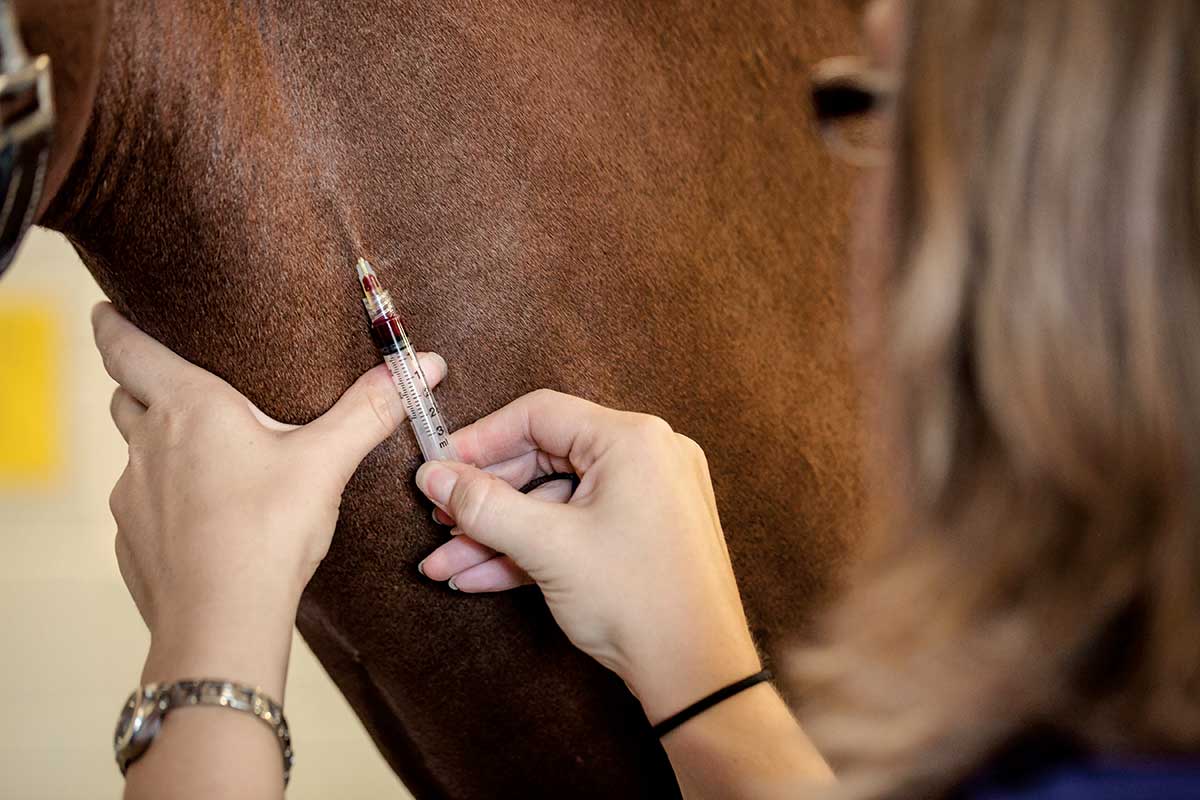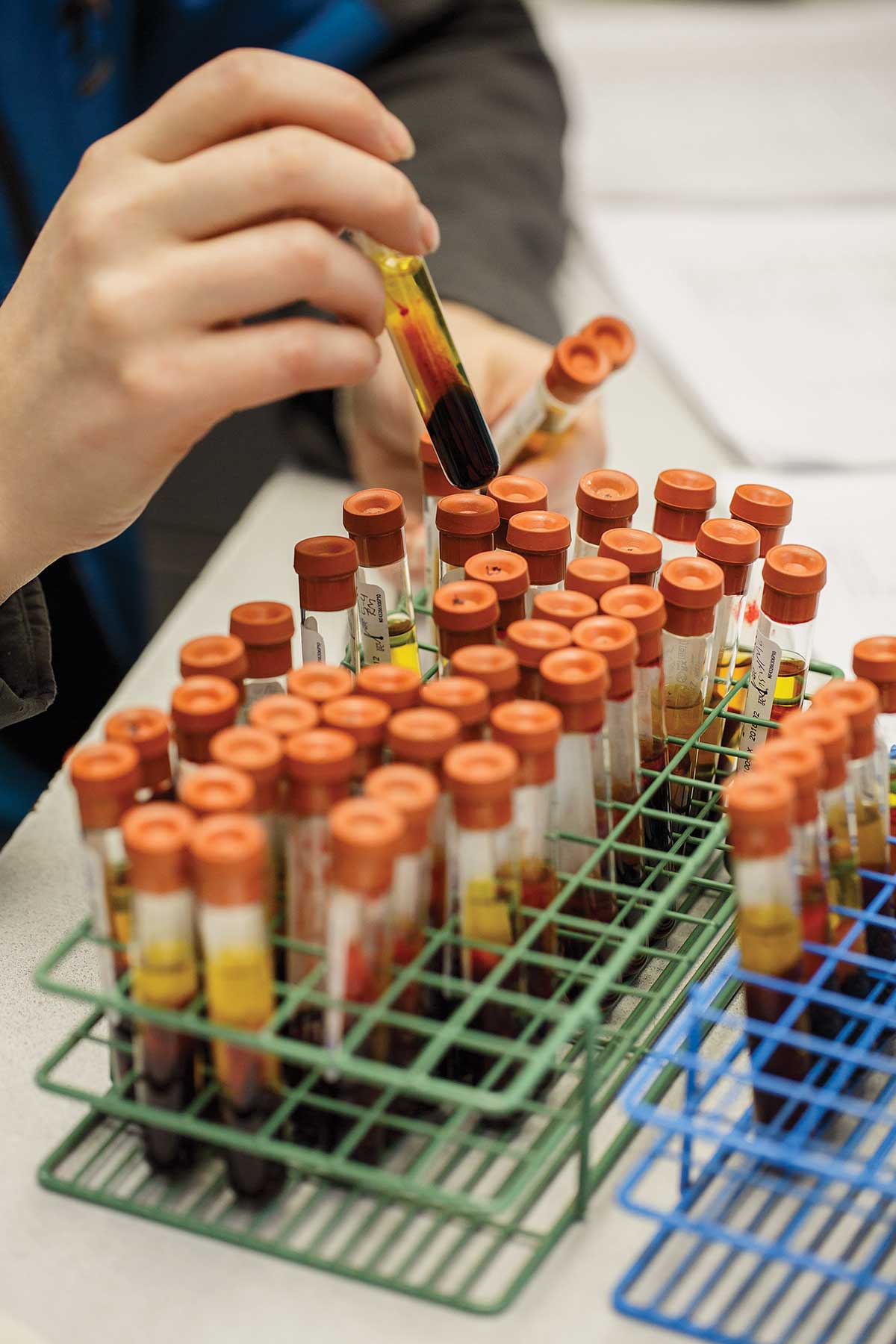
You’ve heard the word “titer” come up in conversations in your barn, at the feed store, or on the Internet. Could your vaccination decisions really come down to a simple blood test? You’ve heard a blood titers test will tell you whether your horse is protected from various diseases. And if he’s protected, does he really need a vaccination?
Unfortunately, the answer may be more complicated than you think. While blood titers do give you some information about your horse’s immunity, they don’t tell you everything. A “high titer” against a specific disease doesn’t always provide a black-and-white answer about whether you should vaccinate or not. Add to that the expense of running titers compared with the expense of simply vaccinating, and practicality also enters the equation.
In this article, I’ll explain basic immunity so you can better understand what titers communicate. You’ll learn what titers are and what they really tell you, plus find out when running a titer against a specific disease makes sense and when it doesn’t. Finally, I’ll explain alternatives to titers that might help you make rational and practical decisions about what vaccinations to administer to your horse.
IMMUNE-SYSTEM BASICS
The first step for understanding titers is to understand a little bit about what your horse’s immune system does and how it functions. The immune system is responsible for mounting a defense against foreign invaders—such as bacteria and viruses (called “antigens”)—that can cause disease. There are two primary branches to the immune system: cell-mediated immunity and humoral immunity.
Cell-mediated immunity is the non-specific branch of the immune system. White blood cells called T-lymphocytes identify and destroy foreign invaders directly. They also attack cancer cells and assist with the functions of humoral immunity.
Humoral immunity is the branch of the immune system that targets specific invaders through production of antibodies—antigen-specific proteins that are released by white blood cells called B-lymphocytes. When the B-lymphocytes recognize an antigen, they produce and store antibodies that’ll target that specific threat if it ever comes around again. Your horse will develop antibodies when he’s exposed to a disease, whether he gets sick or not. If he does get sick from a virus or bacteria, he’ll have lots of antibodies to spare and will be much less likely to get sick from that same organism in the future.
Humoral immunity is the mechanism we manipulate when we administer vaccinations. By injecting your horse with a small amount of virus or bacteria that’s been altered so it won’t cause a given disease, we trick the body into producing and storing antibodies that’ll protect it in the future and prevent your horse from getting sick if he’s exposed to the real-life disease-producing organism.
Whether your horse produces and stores antibodies because he’s exposed to an organism, contracts a disease, or is vaccinated, these antibodies will dissipate over time. When this happens, your horse’s ability to protect himself is diminished until he’s exposed to the organism again, ideally through vaccination rather than by getting sick.
WHAT’S A TITER?
A titer is simply a test to measure the number of antibodies against a specific antigen in your horse’s blood. The number of antibodies detected correlates to the strength of your horse’s immune response against the organism.
Titers are measured with tests that detect antibodies on a series of dilutions of your horse’s blood. The sample will be diluted 1:2, then 1:4, then 1:8, and so on, until the highest dilution is reached where no antibody can be detected. The more dilutions that can be made with antibodies still being detected, the more antibodies are present in your horse’s blood, and the stronger his immunity.
Test results will be expressed using the dilution factor. For example, a 1:200 titer against the organism that causes strangles would be considered very low, while a 1:3,200 titer would be considered very high.
A titer test will tell you whether your horse has antibodies against a specific organism and give an indication about how many antibodies he has. But what does it really tell you about his health status? That’s the million-dollar question—and the place where titer testing is often misunderstood.

WHAT TITERS (DON’T ALWAYS) TELL YOU
About Exposure to Disease
It seems simple, right? You’re worried that your horse has contracted a specific disease, so you ask your vet to run a titer. It comes up positive, so that means your horse has the disease, right? Not exactly.
All a titer really tells you is that your horse has been exposed—and mounted an immune response—to a disease. That exposure could have been years ago or just last week. In fact, it could be completely meaningless.
Although the level of the titer can give some indication of the likelihood that your horse has contracted a specific disease, in most situations “paired titers,” titer tests run several weeks apart, are necessary. To confirm a diagnosis, your horse must have a significant rise in titer over a period of time. The problem is that the second titer, which provides the answer to the diagnosis, often comes too late to be of any use. In most cases (we hope!) your horse will be fully recovered before you have an answer. If, however, your vet is trying to determine what caused your horse’s disease with the goal of protecting others and avoiding an outbreak, paired-titers can be very helpful.
In many diagnosis-seeking situations, a negative titer is more useful that a positive titer. For example, if your horse begins showing neurological symptoms consistent with equine protozoal myeloencephalitis (EPM), your vet might recommend you run a titer to help rule out this disease. Although it’s not 100-percent reliable, a negative blood titer against EPM gives pretty strong evidence that your vet should look for a different cause for your horse’s symptoms. Another example where a negative titer might be useful is for the bacterium called leptospirosis—a potential underlying cause of uveitis (a common and serious eye disease). As many as 75 percent of horses have been exposed to leptospirosis and develop antibodies without ever becoming sick. Because of that, a positive titer doesn’t mean much when trying to confirm a cause of uveitis. A negative titer tells you that leptospirosis is an unlikely cause of your horse’s eye disease.
Vaccinations: Risk-Benefit Assessment
If titers aren’t a practical option, how do you decide what vaccinations you should administer to your horse and when? Your best approach is to evaluate the risks versus the benefits of every vaccination you’re considering. Answering the following questions will help you decide.
How serious is the disease? If the disease is almost always fatal (such as tetanus), there’s more reason to vaccinate than if your horse might get sick, but is likely to recover (such as influenza).
Can the disease be spread to humans? A disease like rabies isn’t only always fatal, but can spread to humans. That makes vaccination against something like rabies more justifiable, especially if your horse lives outside and is in contact with wildlife in an area where rabies is common, meaning he has a high exposure risk.
How effective is the vaccine? Some vaccines, such as those that protect your horse against tetanus, are extremely effective. Others aren’t. You might choose to eliminate less-effective vaccines from your horse’s schedule, especially if he’s a bad reactor or has limited exposure risk.
Does the vaccine have a high risk for side effects? Some vaccines rarely cause reactions, while others can cause serious problems. It makes more sense to skip a vaccine that’s associated with side effects.
What is your horse’s exposure risk? Does he live in an isolated barn with no other horses in sight? Chances are he won’t fall victim to an influenza outbreak. Does he live in a busy show barn with horses coming in and out every day? His risk for exposure to influenza is higher, and you should choose to vaccinate.
Is your horse a reactor? If your horse gets sore or develops a fever every time you vaccinate, that might be good reason to eliminate some less-crucial vaccinations from his schedule.
If you’re worried about over-vaccination, your best bet is to discuss your concerns with your veterinarian. Your vet can answer all of your questions about the risk versus the benefits of the many different available vaccines, and help you design a reasonable plan to best protect your horse while minimizing risk.
About Your Vaccination Choices
What about using titer testing instead of vaccinating your horse? It’s true that a strong positive titer is a good indicator that your horse has a high level of circulating antibodies against a specific disease. But it doesn’t always mean that he’s completely protected against getting sick. Remember, cell-mediated immunity is important, too, and doesn’t involve antibodies at all. It’s also true that high numbers of circulating antibodies are more protective for some diseases than for others.
Unfortunately, the practicality of running titers in place of every vaccination also comes in to play. The cost of running titers ranges between $80 and $200 dollars per organism. Considering that the core vaccinations recommended by the American Association of Equine Practitioners for every horse in the United States include five different organisms (tetanus, eastern and western encephalitis, West Nile virus, and rabies), with two optional vaccinations that are considered important for many horses (influenza and rhinopneumonitis), your titer testing could cost $1,000 or even more each year—just for the basics. For most horse owners, this simply doesn’t make sense.
There’s one specific situation, however, where your veterinarian is likely to recommend a titer to help minimize vaccination risks. The vaccination against Streptococcus equi, the organism that causes strangles, has a risk of serious side effects if given to a horse with a high circulating-antibody titer. This vaccination can lead to a bodywide immune-system reaction called purpura hemorrhagica. This inappropriate immune response causes a vasculitis, or inflammation of blood vessels throughout the body. Damaged blood vessels leak fluid into the tissues to cause extreme swelling, most commonly of the legs, face, and belly. In severe cases, internal organs are affected. Purpura hemorrhagica can even be fatal. If your horse has ever been sick with strangles, or been vaccinated against strangles regularly, it’s a good idea to request a titer before you vaccinate. Some veterinarians even recommend a strangles titer prior to vaccination for any horse. If your horse has a titer of 1:1,600 or higher, vaccination against strangles should be avoided.






